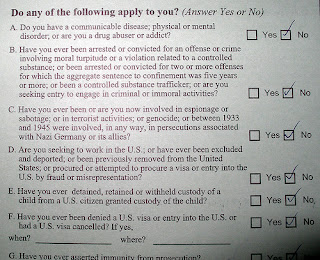In Barbados, I may have come across as a whenwe to the staff in the consular section. I couldn't help myself from comparing how the local staff prepared visa application packages for us to review with how it was done in Germany. There were some big differences.
 |
| Image of mail by Warm 'n Fuzzy, via Flickr.com |
- They opened up the mailed-in applications and stacked all the documentation behind the application itself and stapled the package together at the top.
- They also stapled the photo to the corner of the application.
- They compared the information on the applicant's passport with the first six lines of the application form.
- If there were any discrepancies, they circled the item on the application form.
- They also checked to see if there was a previously issued visa in the passport and added a note on the application so we rarely ever had to open the passport to look at it.
- They stacked about 20 applications in a box and stacked the boxes in the order the applications were opened, with the most recently opened boxes on the bottom.
- To make sure we knew which boxes should be done next, they also added a paper with the date stamped on it to the top of each box.
- Before we consular officers even looked at the boxes, the staff ran the names through our name check system and provided the information from the name check with the application and the printout for the box to be sure we saw all the results.
- If the applicant had applied before and been refused, they pulled the previous applications from the files and attached them as well.
 |
| Image of questions on a U.S. visa application by Magalie L'Abbé, via Flickr.com |
I thought that is the way it was done in all consular sections. I suspect that all first-tour consular officers end their tours thinking what they experienced is the way it is done in all consular sections. But most consular officers on the visa line only do that work in one consular assignment. I was an exception. I had experience, but that didn't mean I was an experienced consular officer. I was a whenwe.
Here is how the local staff prepared the visa applications for us in Barbados.
- They opened the outer envelope.
- They removed everything from the envelope and stuck it into the middle of the passport.
- They wrapped a rubber band around the passport as many times as they could.
- They stacked them in boxes and put them on our desks.
Locating previous applications was another big difference. In Germany, we kept only applications of those who had been refused, sorted alphabetically by last name, in our file drawers in the office. Approved applications were alphabetized by last name and bundled by date and stored in a store room in the basement. In Barbados, all applications were kept in the file drawers by date, but the applications were not alphabetized. They were folded into thirds with just a sliver of the top of the form folded over and stapled. That bit of folded-over paper often hid the form behind it. We had to remove the entire day's packet of applications and spread them out on a desk to find the application by looking through them one at a time. Often, the application we looked for wasn't there because the applicant came back another day so the previous application may have been removed from that day's pile and refiled on another date. I asked Anthony* why the applications weren't alphabetized before they were filed away. His response: Why did we Americans always think things should run more efficiently at the consulate than at Bajan government offices? Our applicants didn't expect better service from us, so why should we give them better service?
When all of that was done, we had the same decision options - issue the visa or invite the applicant for an interview. But, when making the decision to issue, the work still wasn't done because the name checks weren't done until after the decision to issue. There was a logical explanation for why the name checks were done in a different order in the two countries. In contrast to Germany where the majority of the applications were approved, in Barbados, the majority of the applications were refused. The name checks were not necessary for the applications we refused. To reduce unnecessary work (hooray!), name checks were only run once we made the decision to issue. If the name check turned up information, that meant a second interview.
But it still seemed like so much work that changing the process could eliminate. Having already heard the local staff complain about how all the Americans made changes just because we did things differently elsewhere, I kept my thoughts to myself until one day when I was the only visa interviewing officer in the office. The waiting room was full. I had to interview everyone, and I still would have to deal with the mailed-in applications. I decided to ask Cartright*, the senior local employee, to try following a different process. I don't think I mentioned that what I was about to ask was based on my experience in Germany, but I am sure Cartright wasn't fooled. I asked him to have the staff open up all the envelopes, remove the contents and stack and staple the documents together and then put them inside the passports without rubber bands. He didn't look happy, but he said he would follow my instructions.
Here is how he and the others followed my instructions:
- They opened all the envelopes.
- They took the papers out of the envelopes and stacked them together, some of them upside down, some of them reverse side up, some of them the reverse side up AND upside down, some of them folded in half.
- They folded the resulting stack of papers in half and stapled the stack of papers in the middle, with several staples.
- They put the papers inside the passports and wrapped them with a rubber band before putting them into the boxes.
I let it go for a few days. Eventually I mentioned to Cartright that I would like the documents all facing the same way and with the tops of each at the top of the stack, with just one staple. At that point, Cartright had reached the end of his patience. He threw the passport and application documents he had in his hand onto his desk and shouted at me that he was only doing what I had told him to do and here I was telling him to do something else instead.
Change doesn't come easily in the Caribbean.
*a name, not necessarily the right one
No comments:
Post a Comment